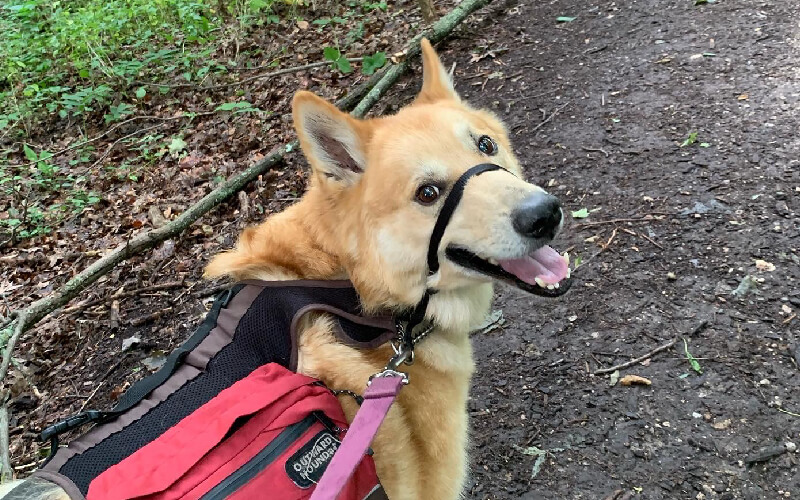Like veterinary professionals and animal welfare agencies, LifeLearn Animal Health Senior Graphic Designer Jennifer Boergers knows that senior shelter and rescue dogs do not get adopted as often as puppies and young dogs. Yet adopting shelter and rescue dogs has been such a joy for Jen that she has adopted and cared for 11 dogs from foster families and rescue organizations.
To assist you in your decision-making if you’re considering adopting an older dog but feeling hesitant about what you may encounter, Jen shares her story of one adopted mixed-breed dog named Reo, a gentle and loving soul rescued from confinement and neglect. She also shares considerations she made prior to adoption and why senior pet adoption for her continues to easily outweigh what others may call challenges.

The Appeal of Senior Dogs
Having lived with dogs her whole life, and having experienced all stages of a dog’s life, Jen says, “I always loved the senior time—not just the slow walks in the woods or the long snuggle sessions on the couch but also the patience and care for them in that stage. Caring for a senior dog is a way to give back all the joy and love they gave to you. The second reason was that I knew, because I had so much experience with aging dogs, that I could provide a good retirement home for a senior dog who may not be as adoptable as a puppy or younger dog.”
Asking Hard Questions Prior to Adoption
Jen understood that, while all dogs at all stages of life can cost money beyond simple food and toys, senior pets often come with age-related health conditions that may require veterinary medical intervention. To cover costs, she also understood from personal experience that “senior dogs—especially ones without medical records—are not insurable,” or insurable with expensive monthly premiums. To assess whether she would be financially able to provide everything that a newly adopted senior pet may need, Jen enlisted the help of her veterinarian.
“I had a very blunt and sobering talk about financial investment,” says Jen. “This was before I even started looking at dogs because I knew all sensibility and logic goes out the window when you are looking into those soft little eyes.” To assess the financial viability of adopting a new senior pet, Jen asked her veterinarian for the billing history of a senior pet she’d previously adopted named Oliver.
“He was a large breed,” Jen recalls of Oliver, who had recently passed away at age 15. “He had several health issues in his later life. I knew I had invested some resources into his care, but I wanted to know just how much. I requested his billing history for the last five years of his life and took into account his after-life care. I also requested a cost analysis for a puppy and compared the two. Surprisingly, even with all of Oliver’s interventions, the cost was identical.”
After careful research and consideration, plus conversations with friends and family, Jen decided she could move ahead to adopt Reo, “and do it in a way that honored that dog’s senior years.”
Reo Was a Surprise and Delight, Despite a Painful Past
“I knew about all of Reo’s challenges before I even started the adoption process,” says Jen, who’d been given Reo’s bio by the rescue organization. Reo had some significant health issues because of the neglect he’d suffered, which included underdeveloped muscles from being confined to a small space for most of his life. So, Jen expected Reo would require some initial veterinary care, including a dietary and physical rehabilitation regimen, and time to come out of his shell. “What I didn’t expect,” says Jen, “was how incredible he was. Despite all his hardships in life, he is so well-behaved, calm, relaxed, loving, quiet, and a joy to spend time with. Giving him the attention he needs is turning him into the perfect dog, and to be honest, he was pretty close to begin with.”


Jen’s experience with Reo highlights why many people prefer to adopt senior pets. Unlike puppies, older dogs are typically already housetrained and understand basic commands like sit and stay. They commonly have lower exercise demands and happily enjoy leisurely neighborhood strolls versus vigorous hour-long playtime in a dog park. They’re calmer and generally less destructive (though they still require boundaries), and you get what you see because they’re fully grown, and their personality has already been established.
Attesting to this, Jen says, “There wasn’t too much work for me. Reo was fully potty-trained, could sit, shake a paw, and lie down, and didn’t bark or have any destructive behavior, and really only needed recall and leash training.” Jen has had similar experiences with all of her 11 adopted dogs, saying, “I honestly haven’t experienced any of the traditional worries and stigma surrounding senior dog adoption specifically. All my rescues, senior and not, have adjusted to their new home within two weeks.”
As for any behavioral issues that may come up with adopted pets, Jen says, “Any behavior hiccups are training opportunities, and as long as you have the tools to address them, you are good.”
Speaking to the best aspect of adopting senior pets, Jen adds, “Most of all, adopted senior pets know what you did for them and let you know it every single day! They are overjoyed to spend time with you and love you twice as much.”
That’s certainly the case with Reo. Thanks to Jen and the assistance she received by consulting her veterinarian, Reo is now happy and healthy, and loving his life with Jen as much as Jen loves life with Reo.






